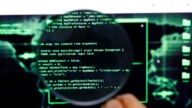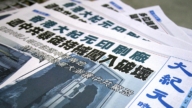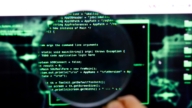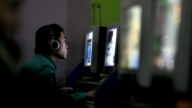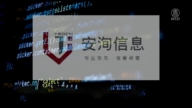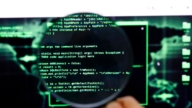【新唐人2011年8月27日讯】《中央电视台》上个月在一个军事科技节目中,出现两名解放军军官演示使用软件攻击美国法轮功网站的镜头。此事引起美国媒体和军事研究机构的关注。《华尔街日报》,《美国之音》都给予报导。在这之前中共官方一直否认攻击别国网站。
《中央电视台》在7月16号的《军事科技》节目中播出“网络风暴来了”,请到军事专家杜文龙解说网络攻击在军事行动中的用途。在演示一种网络攻击的软件时,在下拉选单当中赫然可见“法轮大法在北美”、“法轮大法网站”、“明慧网站”等法轮功网站。接着电脑鼠标移到“攻击”的按键上头,并且按下攻击指令。
美国《华尔街日报》报导,军事分析服务机构“洞察中国”(China SignPost)的埃里克森(Andrew Erickson)和柯林斯(Gabe Collins)周三发布一份报告,特别分析了这段视频。埃里克森是美国海军战争学院(US Naval War College)中国海事研究所(China Maritime Studies Institute)副教授,柯林斯是俄罗斯和中国大宗商品及安全事务专家。
这两名军事分析家表示,尽管演示的攻击手法是十年前的陈旧手段,但这是来自中共官方消息来源中,第一个直接可视性证据,推翻了北京之前所说的,从未出于政府目地进行任何形式的海外黑客攻击。埃里克森与柯林斯都认为,这个信息的泄露具有重要意义。
北京宪政学者陈永苗认为,中共表里不一,露出马脚毫不奇怪。但是从另一方面来看,中共把法轮功网站作为重点攻击目标,说明法轮功团体在推动网络自由方面起着中流砥柱的作用。
陈永苗:“法轮功的网站确实在推动中国的网络信息自由上那是居功至伟的,是至为重要的,比如《动态网》,以及很多代理软件的开发,法轮功这一块在做推进世界网络自由和信息自由,在通过网络层面来做,我觉得功劳是最大的。所以他要挑你们作为一个攻击的目标, 我觉得没有太奇怪的事。”
由中国维权人士成立的“六四天网”网站服务器位于美国,也多次遭到黑客攻击。天网义工蒲飞表示,作为纳税人供养的军事部门,他们军事攻击的目标应该是敌方的军事网络目标,而不是法轮功网站和民运网站。
蒲飞:“如果解放军网络攻击是相对于别国的军事网络目标,这个大家可以理解。因为这是正常的国防军事行动。但如果他长期以来把这个网络攻击的重点,放在法轮功朋友的一些网站,包括我们‘六四天网’和其他网站,这明显是藉用军事手段进行政治打压的做法。”
蒲飞认为,中美双方政府应该严肃回应这起事件。
蒲飞:“我们认为中国政府应该做出明确交代,指出这个东西到底是怎么回事?是演示视频,还是他们平时训练的一个内容?我们也希望美国政府能够对一些敏感网络,特别是涉及中国人民民主自由,比如像‘法轮功网站’和‘六四天网’这类长期关注人权民主自由的网站,给一个明确的保护态度。”
中共国防部5月份披露,它们已经组建一个30多人的网络防御部门“蓝军”,不过坚称这只是出于防御目地。
但是外国安全官员和互联网安全专家相信,有相当大一部分军事和公司网络袭击源于中国。网络安全公司McAfee Inc.今年2月说,至少自2009年以来,疑似位于中国的黑客,对五家跨国能源公司进行了网络间谍活动。
McAfee本月(8月)又公布了一份报告表示,某一个所谓的“国家角色”,多年来策划了针对多个组织的大规模网络攻击,其中包括联合国机构、台湾政府和国际奥委会(International Olympic Committee)。
美国五角大楼今年7月份公布了一项新的互联网战策,已经把网络攻击提升为国家安全问题,未来不排除以军事武力反击。
新唐人记者秦雪、萧宇采访报导。
Chinese Military Attacks Falun Dafa websites
In a show of military technologies of China Central Television
(CCTV) showed two officials of People’s Liberation Army (PLA)
attacking Falun Dafa websites in the U.S.
This has caught the attention of the U.S. media
and military research institutes.
The Wall Street Journal and Voice of America (VOA) both
covered the story.
Prior to this, the Chinese authorities’ official website has
denied attacks on other countries websites.
Chinese Military Attacks Falun Dafa websites
In a show of military technologies of China Central Television
(CCTV) showed two officials of People’s Liberation Army (PLA)
attacking Falun Dafa websites in the U.S.
This has caught the attention of the U.S. media
and military research institutes.
The Wall Street Journal and Voice of America (VOA) both
covered the story.
Prior to this, the Chinese authorities’ official website has
denied attacks on other countries websites.
CCTV broadcasted in its Military Technologies show on July 16
‘Cyber Storm is coming’, and invited Du Wenlong,
a military expert to explain the use of cyber attacks
in military operations.
In demonstrating the use of a cyber attack software,
surprisingly, it showed in a drop-down menu
“Falun Dafa in North America”, “Falun Dafa website”,
“Minghui” and other Falun Dafa websites.
Then Du moved the cursor to the ‘attack’ button,
and clicked it to order an attack.
Wall Street Journal reported that Andrew Erickson and
Gabe Collins a military analysis organization “China SignPost”
released a report on August 27,
after specifically analyzing this video.
Erickson is an associate professor in the Chinese Maritime
Studies Institute of the U.S. Naval War College.
Collins is a security expert on
Russian and Chinese commodities.
The two military analysts said that despite the decade-old
attack methods in the demonstration,
this is the first piece of visible evidence from the Chinese
Communist Party’s (CCP) official sources.
It has overthrown Beijing’s previous statement that
it never carried out any form of hacking overseas.
Ericson and Collins believe that the disclosure of
this piece of information is very important.
Beijing constitutional scholar Chen Yongmiao said that it is
not surprising that the CCP thinks one way and acts another.
However from another perspective, the CCP sees Falun Dafa
websites as its main hacking targets, which indicates that
Falun Dafa is the backbone of Internet freedom promotion.
Chen Yongmiao, “Falun Dafa websites contributed greatly
in promoting Internet information freedom in China.
For example, “dynamic network” and many proxy software
were developed by Falun Dafa practitioners
to promote international Internet and information freedom.
So, it is not surprising that the CCP picks on (Falun Dafa websites)
as its targets of attacks.
Chinese human rights activists have set up 64Tianwang.com,
whose server is located in the U.S.
and it has been repeatedly attacked by hackers.
Tianwang’s volunteer Pu Fei said that
as China’s military is supported by the taxpayers,
their targets should be enemy militaries’ online items,
not Falun Dafa websites or human rights activities websites.
Pu Fei: “If PLA attacks other countries’ military online targets,
we can see them as normal national defense actions.
However, if it has been attacking Falun Dafa websites and
64Tianwang website and other sites,
it is obviously trying to achieve political suppress,
with military means.
Pu said that the Chinese and U.S. governments
should respond to this seriously.
Pu said “We think the Chinese government
should give a clear explanation about it.
Is it just a demo video, or real materials used in its training?
We also hope that U.S. government could have a
clear protective attitude towards those “sensitive websites,”
particularly those regarding China’s democracy and freedom,
such as Falun Dafa websites and 64Tianwang.com,
which focus on democracy and freedom.
Chinese Ministry of Defense disclosed in May that
they have formed a website defense department
composed of about 30 people, which is called the Blue Army.
It insisted that this is only for defense purposes.
However, foreign security officials
and foreign Internet security experts believe that
a significant amount of military and corporate
web attacks originated from China.
Internet security company McAfee Inc. said in February 2011
since 2009, suspected hackers from China had been attacking
five multinational energy companies
and performing network espionage.
McAfee has published a report in August 2011 that
a certain ‘nation’ had planned for many years
large-scale network attacks towards many organizations,
including UN agencies, the Taiwanese government
and the International Olympic Committee.
In July 2011, the Pentagon announced a new Internet war
policy that upgraded cyber-attacks as national security issues.
Also, the U.S. will not rule out future counterattacks.
NTD reporters Qin Xue and Xiao yu



